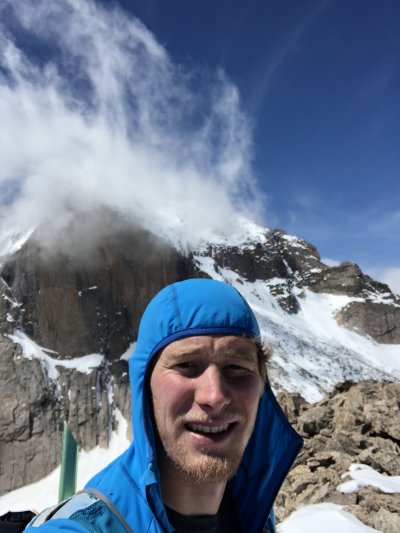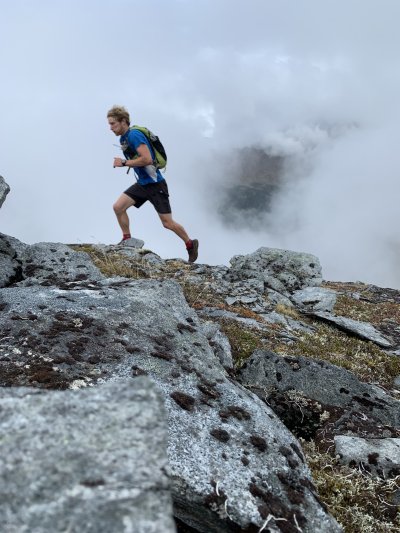I grew up playing sports; I've always loved being active and the camaraderie that sport brings. After competing in triathlons and bike races, I eventually found a sport called adventure racing. It is regarded as one of the most extreme endurance sporting events in the world and races typically involve a variety of different activities such as running, mountain biking and kayaking. Race locations can be extremely remote—I've competed in the wilderness of Alaska and the jungles of Brazil—and events can take up to ten days. When you're out in the wilderness and pushing your body to these extreme levels, it's your strength of mind and the support of your teammates that gets you through the brutal moments.
So, the ski mountaineering—known as "skimo"—race I took part in on January 6 was not an activity that was out of the ordinary for me. My girlfriend Liz and I were in Whitefish, Montana looking at houses in the area and found out about the Whitefish Ski Resort's Wednesday Night Race League from a guy I met while skiing one morning. The race was a fairly short event for me and consisted of three loops. Competitors "run" up the mountain with skis on for 800 feet, transition their skis to downhill mode, then ski down as you would normally at a resort.
In this type of event you do push your body extremely hard, especially at the start. But this particular race was one I could do any day of the week and so I was feeling good; I had been eating a normal diet and not doing anything out of the ordinary beforehand. About 40 minutes before the race began, I remember noticing we had almost taken a wrong turn en route to the starting point and telling Liz that we needed to drive further uphill to a different parking lot. That's my last memory of the day; I don't remember signing in, doing my usual 15 minute warm up, or starting the race.
In these types of races, you put in 100 percent effort right from the start. It is not until you're about 20 minutes in that your body can settle into a rhythm. I've been told that after around ten minutes, I was towards the front of the pack when I collapsed and went into cardiac arrest.
A few seconds later, I was found by another competitor, Stella Hobbs. She noticed I wasn't moving at all and yelled to Rachel Desimone, a race participant who was behind her and is a nurse practitioner. About 10 seconds after that, two physicians who were taking part in the race—Tyler Hoppes and Peter Heyboer—also arrived. They could all tell something was wrong as I was extremely pale and when they checked for my pulse, they weren't able to locate it. That's when Rachel, Tyler and Peter started performing cardiopulmonary resuscitation (CPR) on me in rotation.
People in the outdoor community who do these types of events often have CPR or Wilderness First Responder training. But that training would be nowhere near the level of expertise that Rachel, Tyler and Peter have—I couldn't have had three better people and a better community of people around me.
At this point in the race we were in the trees, in an area that wasn't easy to access. A skier went down to alert the Whitefish Mountain Resort Ski Patrol who got to me about fifteen minutes later with an automated external defibrillator (AED). Unfortunately, the first and only AED shock didn't restart my heart, so I had to be taken down the mountain on a ski toboggan. Rachel, Peter and Tyler continued doing CPR as we descended; it was just an incredible amount of effort. I was told that at one point, Peter was knocked off the ski toboggan while performing CPR and so Tyler had to do a running jump back onto the sled to continue the chest compressions.
Performing CPR for just ten minutes is brutal, but the fact that they poured so much effort into keeping me alive is amazing. It took 40 minutes to get to the ambulance, where I was given an epinephrine injection that restarted my heart.
Liz had actually seen people performing CPR on a man at the base of the mountain and moving him into the ambulance. She remembers seeing a guy wearing white ski boots, but never considered it could be her boyfriend. As everyone began to leave the mountain she asked who had been taken away in the ambulance, and was told it was me.
She was then taken to Kalispell Regional Medical Center in Flathead County where she stayed in the intensive care unit (ICU) with me for a day or so before I woke up. Those first few days were extremely hard on her and on my family, who had flown out from Minneapolis. From what I have been told, it's extremely unusual to have an "out of hospital" cardiac arrest—particularly to go 40 minutes without a pulse—and recover with full brain and bodily function.
I'm still waiting on answers about what caused the cardiac arrest. My doctors have told me that I have some sort of heart arrhythmia, but they have said that the arrhythmia alone should not have caused my cardiac arrest. I am awaiting the results from genetic testing and I may need further tests to determine what went wrong.


I've been getting progressively better each day and was approved to go back to work at the end of January, only three weeks after the event. At the moment, I'm working from my parents' home on a reduced schedule. I've been walking and doing cardiac rehabilitation and have even been able to run and ski; I'm just enjoying being alive and having the ability to move. I could spend my time wondering why this happened to me at 31, but the important thing to me is to maintain a positive and forward-thinking attitude.
I've always tried to maintain a positive perspective on life, but having had a near-death experience makes me appreciate loved ones, family and friends all the more. You never know what's going to happen or what life has in store for you tomorrow, so it's important to appreciate those around you.
While I am extremely happy to be back on Earth, I feel I now have a better perspective on what might happen when we leave this blue planet. I was essentially dead for 40 minutes. Death is part of being human, just as much as being alive is. Part of being alive and being human is experiencing pain, struggle, sadness, happiness, joy, exhaustion, and exhilaration. With every day of being alive, I celebrate these emotions and the raw beauty of our world. I cherish the friendships and human interactions that make us all human.
I've thought a lot about those 40 minutes and what actually happened to me during my time without a pulse. I remember an experience that felt as if my energy was being transformed into the universe; my energy was becoming a part of everything.
I can't say for sure that's what happened, or what happens when we die. But, I'm an engineer and my experience has made me think a lot about the laws of thermodynamics. The first law states that heat energy is neither created, nor destroyed, but its form can be converted. This has made me wonder whether, when we die, our energy and our spirit may be converted into something else.
Part of being human is trying to understand what happens when we die. There is a lot we don't know about our world and the universe, but it's still such an amazing thing to be human. I think we get caught up in wondering where we go, but being able to appreciate where we are today is the most important thing.
I've cried more in the past month than I have in my entire life; I think I have run out of tears. But they are mostly tears of happiness. I am still here because of the determination and courage shown by others on the mountain that day. Whether it was giving me CPR or helping me down the mountain, the people at Whitefish Mountain poured their energy into helping me that night; the energy I needed to stay alive. I am acutely aware of that. I know that regardless of my physical fitness, I would be dead if it were not for Rachel, Peter, Tyler and all of the people who were there with me that day.
I'm not yet certain what level of sport I will be able to return to. But I know one thing for sure: being outside, in the mountains with friends is where I love to be and nothing will stop me from getting back out there.
Erik Sanders is currently recovering in Minneapolis with his girlfriend, Liz and his family. Erik and Liz are still planning to move to Montana in 2021. Erik supports the Flathead Avalanche Center and Flathead County Search and Rescue both of which provide assistance to the Flathead community. He is also a passionate advocate for CPR training.
All views expressed in this article are the author's own.
As told to Jenny Haward.
Uncommon Knowledge
Newsweek is committed to challenging conventional wisdom and finding connections in the search for common ground.
Newsweek is committed to challenging conventional wisdom and finding connections in the search for common ground.





